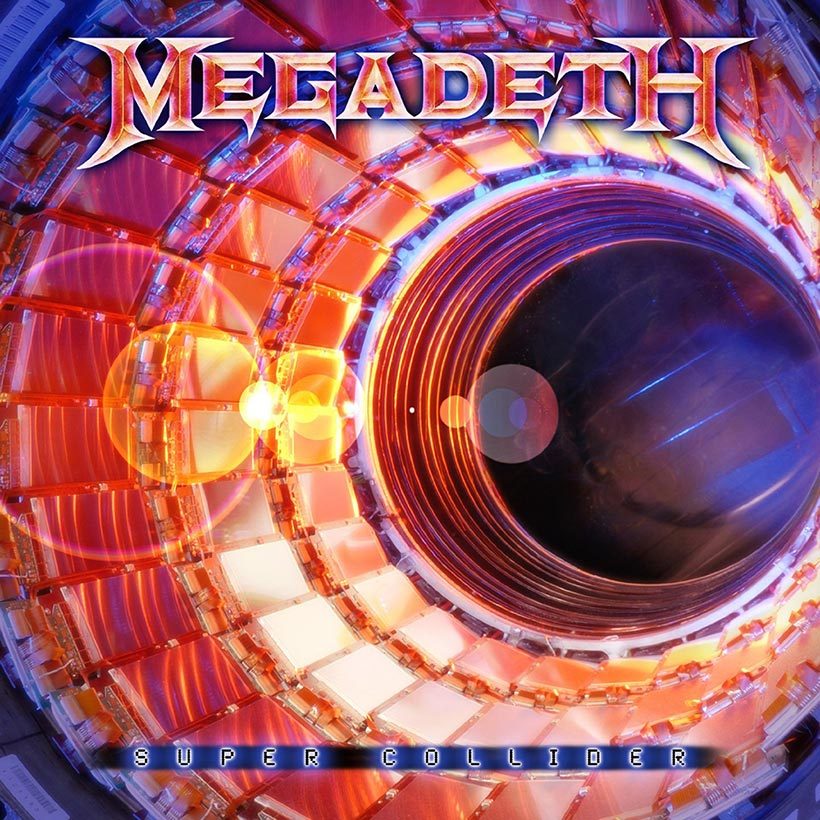‘Super Collider’: How Megadeth Smashed Into A New Era
Aiming for a timeless feel, Dave Mustaine sought to prove that Megadeth could write pop-oriented metal that drew new fans with ‘Super Collider.’

Megadeth have survived some seismic musical shifts throughout their career. When Super Collider was released, on June 4, 2013, the metal landscape was unrecognizable from the thrash terrain they helped forge 30 years earlier.
Listen to Super Collider right now.
Thrash metal in the traditional sense of the term showed a glimmer of life in the late 00s, thanks to the likes of Municipal Waste, Gamma Bomb, and Evile. But, come the early 2010s, the technical precision emblematic of the genre had been adopted by more progressive-leaning bands like Mastodon and Gojira. Meanwhile, thrash had taken a deep dive into the underground and was given a dirty makeover by bands such as Black Breath and Trap Them.
A new beginning
For Megadeth, however, their 14th album, Super Collider, marked a new beginning of sorts. Yes, another one. The veteran thrashers had left the comfort of established record labels for Mustaine to set up his own imprint, Tradecraft Records with distribution through Universal Music Group. But instead of allowing himself free reign to experiment and stretch the limits of the genre he helped define, Mustaine took on a different responsibility.
On Super Collider, the Megadeth frontman wanted to repay the faith his paymasters had invested in him and delivered a record with a more commercial edge. Speaking of the album’s title track, he told Classic Rock Revisited, “It is the first track for our new record label, which is a major label. They love the band and we showed them that… we write commercial metal pop songs that people can’t do anymore, because they’re either afraid, or they sound like they are hacking up a chicken bone; they just don’t know how to do it.”
In fact, Mustaine saw his band as capable of drawing in fans who didn’t necessarily like metal, but would want to explore it on the strength of the songs he crafted for Super Collider. “I think it also opens up a door,” he said. “They are going to listen to that and think, I like that one song, and they are going to get the record and listen to the rest of the album and go, ‘Man, I love this style of music. I’ve been missing out for a long time.’”
The risk, then, was in potentially alienating purist fans. But then a polished sheen didn’t do any harm to Countdown To Extinction, which remains Megadeth’s most commercially successful album.
Aiming for a “timeless classic” feel
Like Th1rt3en before it, Super Collider was produced by Johnny K, a man who knows a thing or two about commercial metal, with albums by the likes of Disturbed, Sevendust, and Staind to his credit. Anyone expecting Mustaine to follow the made-for-radio of those bands, however, would have been surprised by the galloping thrash attack of the album’s opening track, “Kingmaker.” The song was the first to feature a writing credit from bassist David Ellefson after his return to the band (he had departed following 2001’s The World Needs A Hero), so it’s perhaps fitting that its febrile pace harkens back to Megadeth’s earlier sound.
“Super Collider,” however, offers an immediate change of pace. True to his word, Mustaine took the opportunity to write a heavy song with a more archetypal structure, rather than blasting listeners with breakneck riffs. Meanwhile, “Burn!” and “Off The Edge” are midtempo tracks reminiscent of Megadeth’s NWOBHM roots, while the likes of “Built For War” is a groove-metal track on which the band get creative with off-kilter time signatures.
“Dance In The Rain” – featuring a guest appearance from Disturbed’s David Draiman – and “Beginning Of Sorrow” both offer a change of pace akin to Megadeth’s classic “In My Darkest Hour,” before things take a turn for the unexpected. “The Blackest Crow” opens with a banjo sequence; the surprises continue with the addition of violins. Before going full-on hillbilly-folk, however, Mustaine brings it back to a haunting, militaristic arrangement punctuated with staccato riffs. “Forget To Remember” and “Don’t Turn Your Back…” deliver more of the melodic metal Mustaine intended, with the latter punching for a tempo more familiar to Megadeth fans.
It is, however, the track that brings Super Collider to a close that indicates its creator’s mindset for the album. A cover of Thin Lizzy’s “Cold Sweat,” it suggests that Mustaine was aiming for a “timeless classic” feel for Megadeth’s 14th studio release.












